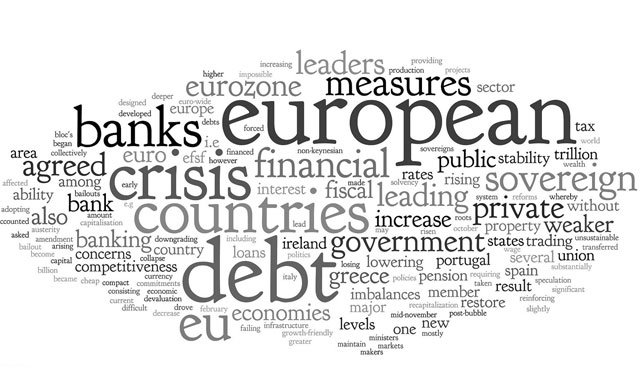6 May 2012
Socialist Party candidate Francois Hollande wins the French Presidential election, beating centre-right pro-austerity incumbent and close ally of German Chancellor Angela Merkel, Nicolas Sarkozy.

6 May 2012
Greek election sees no party with a majority with heavy gains for parties against the EU austerity strategy.
13 May 2012
Greece’s President, Karolos Papoulias, tries to help form a coalition government. This fails and Greece looks ahead to fresh elections.
15 May 2012
Hollande is sworn in as President and immediately flies to Berlin to meet with pro-austerity Angela Merkel.
18 May 2012
Ahead of NATO and G8 summits Merkel, reportedly tells the Greek president to hold a referendum on euro membership.
20 May 2012
At the summit British Prime Minister David Cameron argues that the upcoming Greek election should be viewed as a referendum on euro membership. President Obama argues that there is a “growing consensus” that Europe needs to concentrate on jobs.
21 May 2012
Against the backdrop of a rise in support for extremist parties in countries affected by the crisis, British Deputy Prime Minister Nick Clegg warns that Eurozone collapse would be an “ideal recipe for an increase in extremism and xenophobia”.
23 May 2012
The head of the IMF, Christine Lagarde has argued that Greece must increase tax collection and implement structural reform. Acknowledging that the Greek people have made “huge efforts” to correct their finances, Ms Lagarade said such measures were necessary to ensure that the country stays in the Eurozone – though the IMF is “prepared for all possible solutions”, including Greek default and exit.
24 May 2012
European Council President Herman Van Rompuy has argued that for Greece to remain in the eurozone it must “respect its commitments”. Speaking at an EU Summit Von Rompuy stated that the “eurozone has shown considerable solidarity” and the community is “fully aware of the signficant efforts made by the Greek Citizens”.
24 May 2012
UK Prime Minister David Cameron has strongly argued against an EU-wide financial transaction tax, saying that it “will make Europe less competitive” and that he “will fight it all the way.” After EU leaders tried to raise the issue Mr Cameron stated that the “Financial Transactions Tax is a bad idea – it will put up the cost of people’s insurance, put up the cost of people’s pensions, it will cost many, many jobs.”
24 May 2012
During a speech in Berlin the UK Deputy Prime Minister Nick Clegg is to argue that “no rational person should advocate a Greek exit from the euro”. Leader of the pro-European Liberal Democratic Party, Mr Clegg will argue that “as Europeans, our response to this brewing crisis has been woefully fragmented. We have failed on a number of fronts. “The way we take decisions is undermining public confidence. Every few weeks European leaders sit down to yet another crisis summit, where another temporary solution is agreed.”
25 May 2012
Spain’s market regulator has suspended trading of shares in bailed-out lender Bankia ahead of a board meeting of the bank that is expected to decide on the amount of money it needs from the government. A market commission statement said Friday trading was being halted because “a concurrence of issues could affect the normal exchange of the bank’s shares.”
Bankia, which is Spain’s fourth-largest bank, was part-nationalised two weeks ago because of its problems with bad property debt. Shares in Bankia’s parent company Banco Financiero y de Ahorros (BFA) have also been suspended.
Economy Minister Luis de Guindos said Wednesday the government would pump at least €9 billion ($11 billion) into Bankia but added that more would be available if needed. Spanish lenders are heavily exposed to Spain’s burst real estate bubble. Bankia has been the worst-hit with €32 billion ($40 billion) in toxic assets.
28 May 2012
The euro crisis has moved its attention to Spain, after the news that investors judge its debt to be the riskiest it has been in since the the euro was introduced. Whilst currently at 5.05 percent on 10-year bonds, Spain’s Prime Minister Mariano Rajoy argued that economically the country had taken “the bull by the horns because the alternative was collapse” and acknowledged that the situation was “extremely difficult”.
29 May 2012
David Cameron and Chancellor George Osborne met with Bank of England Governor Sir Mervyn King and Britain’s top bank regulator Lord Adair Turner yesterday to discuss a plan of action in case of a Eurozone breakup, it was widely reported this morning.
Deputy Prime Minister Nick Clegg also attended the hour long meeting, which a Government spokesman last night insisted had been “long planned”. On the agenda for the top government and Bank of England officials was the thorny issue of how to best protect Britain’s financial system and economy from near-imploding Europe – the country’s biggest trading partner.
Spain’s borrowing costs yesterday crept back up to the “danger” level of 7 per cent, with yields on ten year bonds briefly breaking the 6.5 percent mark – the highest level since December.
30 May 2012
Washington this morning dispatched Treasury undersecretary for international affairs Lael Brainard to the troubled Eurozone for meetings in Greece, Spain, and France with senior officials. The meetings would see the officials “discuss their plans for achieving economic stability and growth in Europe,” a Treasury statement claimed. Ms. Brainard arrived yesterday in Greece, and will also be in Germany, Spain, and France this week.
The governor of the Bank of Spain, Miguel Ángel Fernández Ordóñez, added to the sense of crisis yesterday with the announcement he would step down from his position early, (June 10.) Investors fled Spanish debt, seeking the comparative safety of German bonds. This last night drove the spread between the two indicators to a euro-era record, according to a report by Bloomberg News. The yield on Spanish ten-year bonds, had risen8 basis points to 6.48 percent in early trading hours today, meanwhile the Euro Stoxx 50 index, a barometer of euro zone blue chips, fell 1.0 percent, while the FTSE 100 index in London fell 0.9 percent.
31 May 2012
Fears for Spain’s financial health deepened even further last night as the European Commission published its annual ‘Health Check of European Economies’. Findings of the report indicated an increasing gap between the bloc’s leaders and Eurozone countries which are struggling.
While Germany is expected to see growth of 0.7 per cent over the coming year the Italian economy is likely to shrink as much as 1.4 percent while the Spanish economy is expected to be even worse off, with a contraction of 1.8 per cent on the horizon.
With Spanish bank Bankia already requiring governmental assistance, there are fears over the country’s ability to fund future bail outs.
Commission president Jose Manuel Barroso confirmed to assembled media yesterday that EU funds may be used to directly support ailing banks in the future, though he warned there would be no easy solution to the ongoing debt crisis.
Markets reflected the heightened concern at close of play yesterday, with ten year Spanish bonds remaining at levels not seen since before key European rescue measures were announced late last year.
British banks have lent money to both the Spanish government and private sector. The Commission noted the weak outlook for the European economy will likely keep UK growth subdued over the coming year.


















